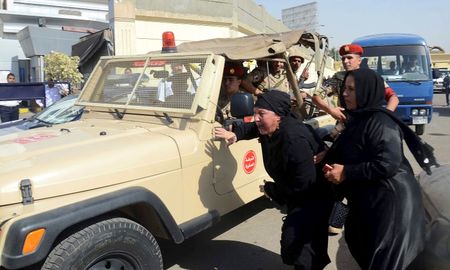CAIRO (Reuters) - Egypt expanded the jurisdiction of military courts on Monday to try civilians accused of attacking state facilities or blocking roads, following some of the worst assaults on security forces since last year's ousting of Islamist President Mohammed Mursi.
The measure, approved by President Abdel Fattah al-Sisi, is likely to be seen by his critics as another clampdown on dissent by a government that has jailed thousands of Mursi's supporters and targeted other activists.
Military courts can currently try anyone charged with attacking military installations or personnel, but Monday's presidential decree gives them jurisdiction over attacks on infrastructure such as roads, railway or pipelines.
It also empowers military courts to try people who obstruct roads, for example by holding unlicensed protests.
The move comes after two attacks on Friday killed at least 33 security personnel in the Sinai Peninsula, a remote but strategic area bordering Israel, Gaza and the Suez Canal.
No group has claimed the attacks, which bore the hallmark of Egypt's most active militant group, Ansar Bayt al-Maqdis.
The decree authorises the armed forces to take part in securing state installations such as power stations, oil facilities, railways and road networks alongside the police.
"This decision applies for two years, and the crimes committed against these facilities will be referred to the military prosecution before being presented to the military judiciary," presidential spokesman Alaa Youssef said.
Sisi, then the army commander, ousted elected president Mursi of the Muslim Brotherhood in July last year following mass protests against his rule. Sisi went on to win a presidential election in May and, in the absence of a parliament, has been ruling largely by decree.
Parliamentary elections are expected to take place within months but Sisi's critics have bemoaned the delay and say he is moving to roll back freedoms won in the 2011 revolt that unseated Hosni Mubarak after 30 years in power.
Sisi's government has banned the Brotherhood, declared it a terrorist organisation and jailed thousands of its members since Mursi's ouster. The Brotherhood, which condemned Friday's attack, says it is a peaceful movement and denies any link to worsening militant violence in the Sinai.

Authorities have also targeted liberal and secular activists, many of whom have been charged under a separate law banning protests.
(Reporting by Mahmoud Mourad, Editing by Lin Noueihed and Dominic Evans)
